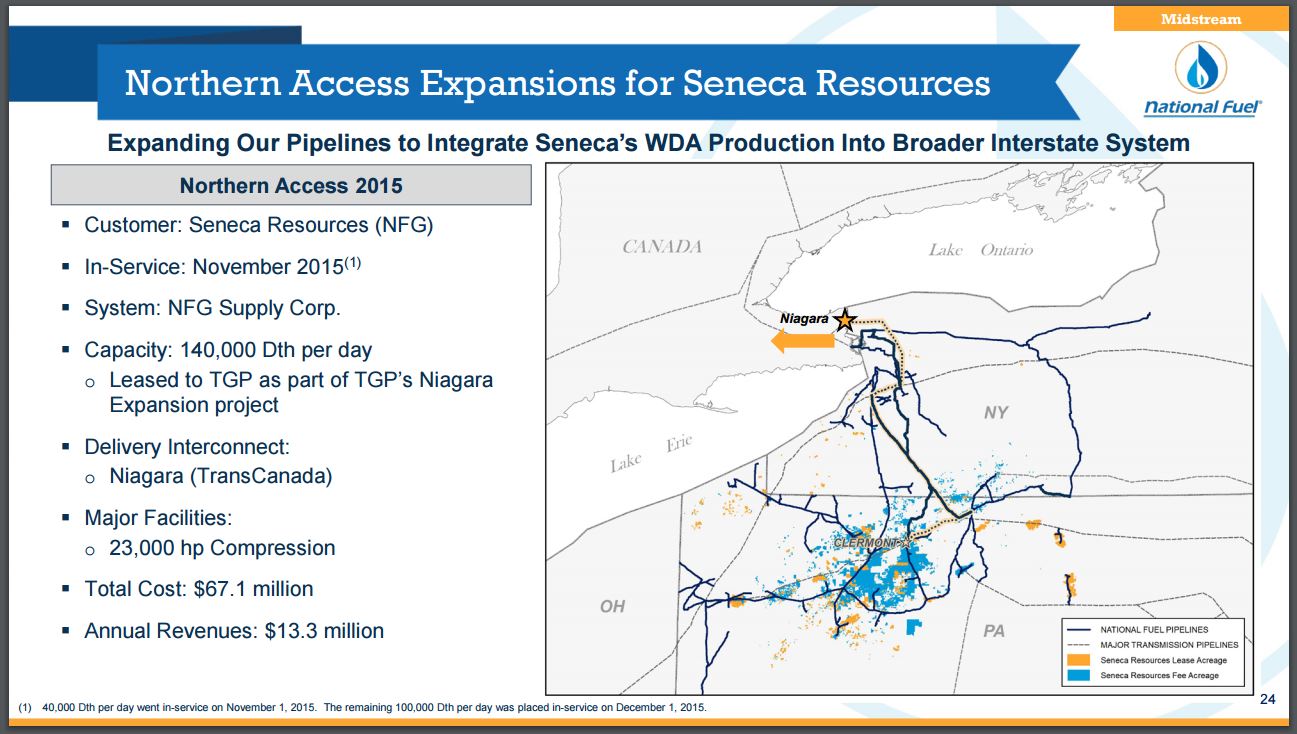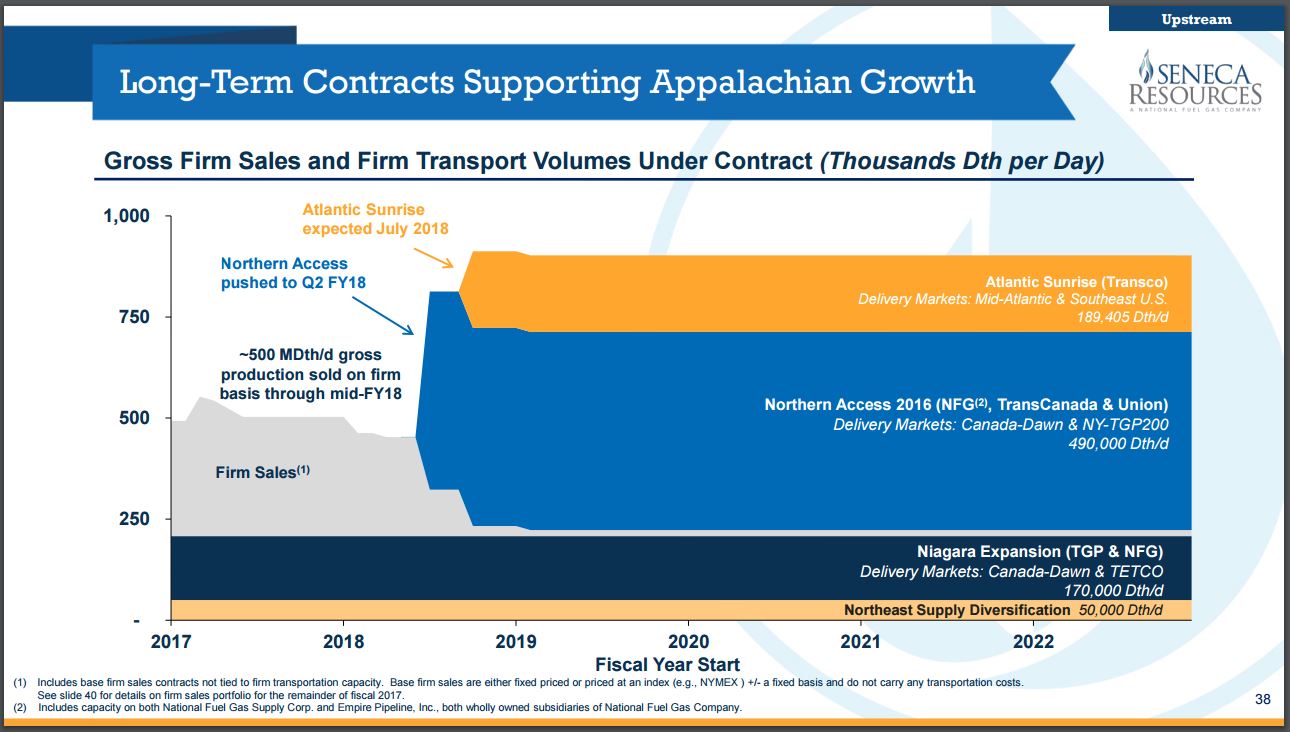New York denial is inconsistent with standards of the Clean Water Act: Tanski
On April 10, National Fuel Gas (ticker: NFG) issued a press release reacting to the denial of its proposed Northern Access pipeline by New York regulators, after more than 34 months in the permitting stage. Northern Access would have brought natural gas from the Marcellus region in Pennsylvania to New York.

The half billion dollar Northern Access natural gas expansion pipeline in Western New York and north-central Pennsylvania was designed to transport Marcellus gas.
National Fuel said the pipeline is estimated to increase annual property tax receipts by $11.8 million for four New York counties, with an additional one-time sales tax impact of $6.6 million for the same four counties. Twelve school districts within those counties will benefit from the annual incremental increase in tax revenue.

New York nixed the Northern Access pipeline project by refusing to issue a water quality certification and wetland permits.
In its announcement, NFG said that National Fuel Gas Supply Corporation and Empire Pipeline, Inc., wholly-owned subsidiaries of Western New York-headquartered National Fuel Gas Company, received information at 11:22 p.m. on Friday, April 7, 2017, that the New York State Department of Environmental Conservation (NYS DEC) issued a denial of the Clean Water Act Section 401 Water Quality Certification and other state stream and wetland permits for the Northern Access Project.
“While we are still analyzing the NYS DEC’s rationale, the denial is purportedly based upon NYS DEC’s determination that Supply and Empire’s construction activities will impermissibly affect the quality of waters in the state, notwithstanding voluminous detailed studies prepared and submitted by the companies and our consultants that show any such effects are temporary and minor,” said Ronald J. Tanski, President and Chief Executive Officer of National Fuel Gas Company.
“These construction activities would certainly have less effect than either exploding an entire bridge structure and dropping it into Cattaraugus Creek (Route 219) or developing and continuously operating a massive construction zone in the middle of the Hudson River (Tappan Zee Bridge) for a minimum of five years, both DEC-approved projects.
”We and our contractors have a great record with respect to our construction practices. Our Empire Connector, Tioga County Extension, and Tuscarora Lateral projects were completed through DEC Region 8 between 2007 and 2015, consisting of 110 total miles of pipeline and crossing 104 streams and 182 wetlands, and utilizing the same proposed construction practices with an excellent environmental record.
“What is perhaps the most troubling aspect of this decision is that the NYS DEC waited literally until the 11th hour to issue this denial, even though we had detailed discussions with NYS DEC staff over a 34-month period and undertook detailed engineering and environmental studies at the agency’s request, to support the stream-crossing techniques that now form the basis of their denial.
“We believe the NYS DEC’s analysis completely ignores the record that we developed in this process and is inconsistent with the standards of the Clean Water Act. Further, it attempts to set a new standard that cannot possibly be met by any infrastructure project in the state that crosses streams or wetlands, whether it is a road, bridge, water, or an energy infrastructure project.
Will NY utilities meet future demand without access to Marcellus production?
“Moreover, we are highly concerned about the ability of utilities in the state to meet the future energy needs of their consumers and the businesses and industries that drive the state’s economy. New York’s continued denial of permits for energy infrastructure projects is simply not sustainable, as it will have the effect of reducing New York’s energy reliability, lead to higher costs for consumers and be a limiting factor in the ability for industry to locate or expand in the state. While New York proclaims that it is ‘open for business,’ and ‘a premier place to invest and grow,’ the NYS DEC’s action belies that claim.
“Today, 57 percent of the electric generation capacity in the state is powered by natural gas, and, as more coal and nuclear power plants are scheduled to be shut down, new gas-fired plants are being built in their place. Additional natural gas infrastructure is essential to connect nearby, growing supply areas to New York consumers. As New York continues a long-term transition to more and more renewable electric generation, it is essential for the natural gas industry to stand ready, at a moment’s notice, to provide the gas supply necessary to generate the power to support the reliability of the power grid. National Fuel remains committed to this energy infrastructure project that will be an important contributor to the energy dependability and economic vibrancy of New York State.”
National Fuel has E&P operations, pipeline and storage, gathering, utility, and marketing operations through its subsidiaries.

